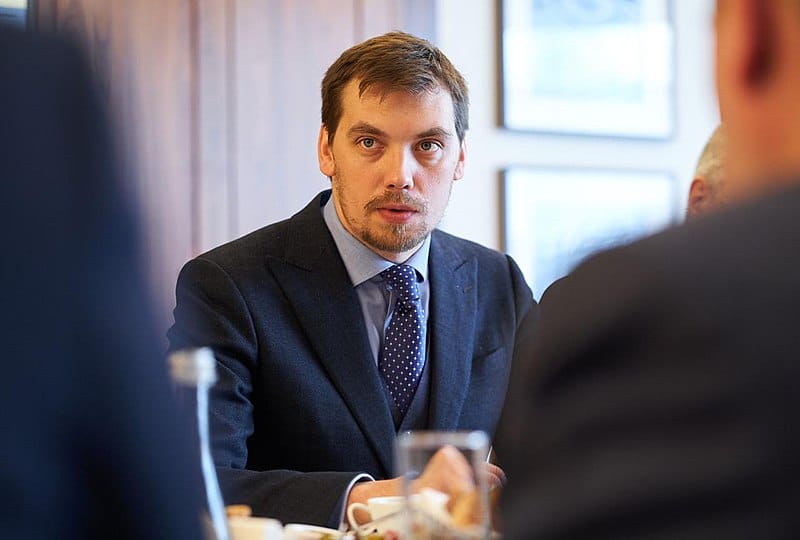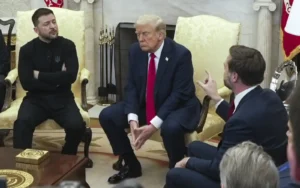Ukrainian prime minister Honcharuk handed in his resignation earlier this week after president Zelensky lost confidence in him. On March 4th Ukraine’s parliament (Verkhovna Rada) accepted his resignation and approved president Zelensky’s choice, Denis Shmyhal, to succeed him in an extraordinary session. 291 members of the Verkhovna Rada approved Shmyhal’s appointment, with 59 opposing and 46 abstaining, while 9 did not vote. President Zelensky hopes the new prime-minister, the third in six months, can “do the impossible” and stabilize Ukraine’s economy.
Government reshuffle
In a speech before parliament ahead of the votes, Zelenskiy blamed Honcharuk for failing to halt an industrial slump and for not meeting tax-collection targets. Honcharuk in return criticized Zelensky as having a “primitive” understanding of the economy in a recording that leaked in January. After the incident, Honcharuk decided to hand in his resignation to “remove any doubts” about the government’s respect for Zelensky. Zelensky however refused to accept the resignation and gave Honcharuk and his government another chance. In the month since the incident public approval of the government and Zelensky fell dramatically which was the catalyst that made Zelensky decide it was time for “new brains and new hearts” in the government.
Honcharuck’s run as prime minister was thus short lived since he was only appointed in August 2019. Besides replacing the prime minister, other changes included replacing Vadym Prystaiko as foreign minister with Dmytro Kuleba, who is also the country’s deputy prime minister for European and Euro-Atlantic integration. In fact, only six out of the 17 ministers in Honcharuk’s cabinet stayed on with Shmyhal: Interior Minister Arsen Avakov, Justice Minister Denys Malyuska, Minister for Euro-Integration Vadym Prystaiko (formerly the Foreign Minister), Foreign Minister Dmytro Kuleba (former Minister of Euro-Integration), Infrastructure Minister Vadym Krykliy and Digital Transformation Minister Mykhailo Fedorov. All others were ousted from the cabinet alltogether.
Economic situation
The appointment of Shmyhal comes days after Ukraine held talks with a visiting mission from the International Monetary Fund (IMF) to try and get board approval for a new $5.5 billion loan program. Financial backing from the IMF is crucial in helping Ukraine recover economically amid the ongoing war in the Eastern regions of the country. With backing from the IMF also come billions of dollars of linked assistance from the EU and other western backers that can help Ukraine’s economy. However, Ukraine does not yet meet one key IMF condition to receive financial support, namely the adoption of bank solvency legislation that will prevent former owners of banks closed or nationalized from reclaiming the businesses or seeking compensation.
The new prime minister
Shmyhal is the person to change this, together with reducing the influence of oligarchs and the level of corruption as Zelensky promised the Ukrainian people during his campaign. Shmyhal previously worked as head of the regional administration in the western Ivano-Frankivsk region where he made a name for himself as a business-friendly governor.
Before that he worked as an executive at DTEK, an energy holding owned by Ukraine’s richest man Rinat Akhmetov. He also headed several business enterprises in his native Lviv for nearly a decade before entering the civil service at the Lviv regional administration.
Concerns
However, his background also made some people anxious. Former US deputy assistant secretary of defense with responsibility for Ukraine, Michael Carpenter, warned Kyiv to proceed with caution. He believes that appointing Shmyhal will give oligarchs “a pathway” back to power, instead of reducing their influence. He says that “so much is at stake here and if we see the influence of people like Dmytro Firtash, Rinat Akhmetov, and other oligarchs through proxies, through people more beholden to their interests than to the national interest, than the [reform] project starts to unwind.”
Smhyhal has had to deny that he has a close relationship with Akhmetov due to his work at DTEK many times. He states that he has never met Akhmetov. “I joined the DTEK company and, in particular, the Burshtyn TPP, and I was its head for the last two years, I got there via an open competition. I began as the Deputy General Director of DTEK Zakhidenergo JSC and then took the position of the head of the Burshtyn TPP. The level of management, with whom I communicated, was: the head of DTEK Energo Dmytro Sakharuk and the head of DTEK Maxym Timchenko. But, by and large, I only met them at official meetings,” he says.
Western analysists are also skeptical about the timing of the government reshuffle. Morgan Williams, the president of the U.S.-Ukraine Business Council (a Washington D.C.-based lobby) says that “the government changes just create another period of uncertainty and instability and possibly delay what we thought could be a major year for Ukraine’s economy.” It is up to the new government to not make this prediction a reality.
Sources: CNN / Washington Post / Kyiv Post / Radio Free Europe / VOA News / 112 UA
Photo: Wikimedia



